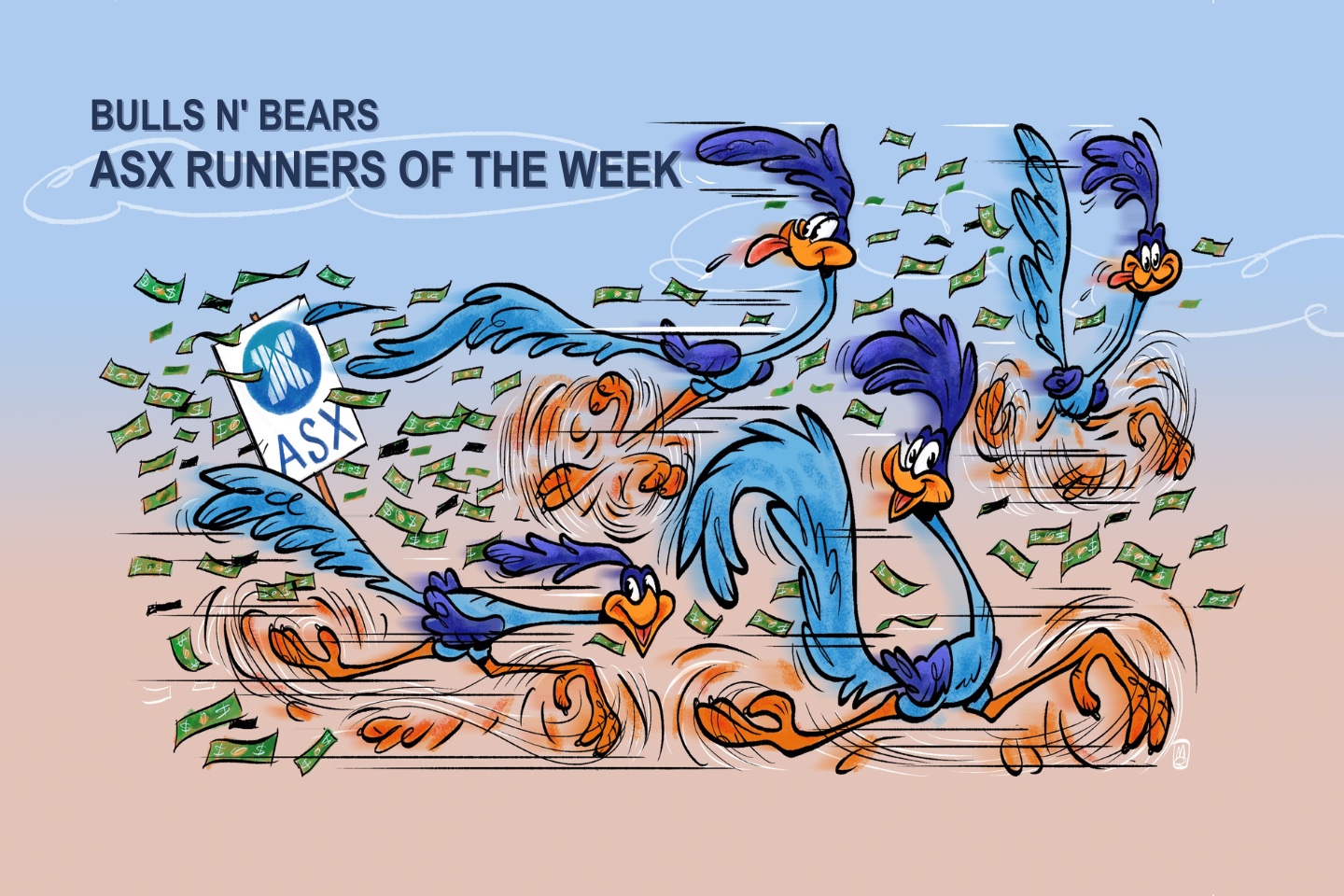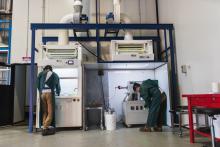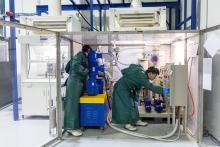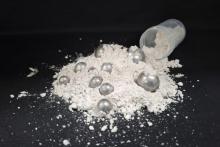Bulls N’ Bears ASX Runner of the Week is… 4DMedical Limited, after the lung imaging tech dynamo secured sweeping FDA and US Medicaid approvals. ABx’s ionic clay coup, SenSen’s AI urban edge and Middle Island’s takeover-tinted Serbian play showed juniors can steal the spotlight in a market spooked by US indicators. With gold blazing, biotechs bleeding and China’s military flexing, these Runners are riding a choppy terrain to small caps stardom.


It’s been a wild ‘buy the rumour and sell the fact’ week in the markets.
Aussie investors decided it was time to pull the pin after higher GDP figures were announced on Wednesday, selling off more than $50 billion in share market value as worries about United States bond yields and higher interest rates caused markets to plunge.
Amid Wednesday’s red sea one sector predictably shone bright - safe haven gold continued its merry way to a record-breaking $5450 an ounce.
But by week’s end the mood had shifted. All bad news is good and good news is bad in interest rate world, as Wall Street cheered dismal US jobs data, betting on a Federal Reserve rate cut before month’s end.
It’s déjà vu for investors who’ve seen this movie before - last time they got burnt by bond yields, delivering the greedy geese a reality check. Which just proves there are no certainties in modern markets.
While Western markets wobbled, China flexed its military might. A victory anniversary parade showcased a who’s-who of Xi Jinping’s allies, with familiar faces such as Russian president Vladimir Putin and his North Korean counterpart Kim Jong-un strutting their stuff. Lurking in the background was an unexpected figure: former Victorian premier Dan Andrews quietly mingled with his comrade pals.
Back home the biotech sector has been bleeding. Since the new financial year, household names such as Telix Pharmaceuticals, Botanix and Argenica Therapeutics have seen their valuations slashed by half or more.
Even CSL - once Australia’s biggest company - wasn’t spared, shedding 25 per cent of its value this month after announcing 3000 job cuts - a gut punch that wiped a whopping $30 billion in valuation off the ASX.
Yet, from the biotech ashes, a phoenix has risen. The top spot in Bulls N’ Bears Runner of the Week was snagged by a soon-to-be-blue-chip Aussie biotech contender. The company secured FDA approval - a golden ticket in the cash-flush world of US big pharma - for its revolutionary respiratory technology, propelling its market cap by more than $600 million in a week.
4DMEDICAL LIMITED (ASX: 4DX)
Up 266% (48c – 176c)
Bulls N’ Bears’ Runner of the Week is respiratory imaging innovator 4DMedical Limited, which tore away from the biotech wreckage last Friday after it secured US Food and Drugs Administration approvals for its CT:VQ platform.
The world-first non-contrast imaging technology delivers quantitative ventilation-perfusion (VQ) analysis from standard chest CT scans. The technology measures the balance of air and blood flow in a patient’s lungs, which is critical for diagnosing conditions such as pulmonary embolism or chronic lung disease.
Unlike traditional nuclear VQ scans, which use radioactive injections to trace the flows, CT:VQ measures regional lung tissue motion and density changes to generate detailed maps – providing a welcome, non-invasive diagnosis.
About 14,500 CT scanners operate across the US - 24 hours a day – which would translate to a lot of tickets clipped for the crucial scans.
4DMedical’s party didn’t stop on Wednesday, when the US Centres for Medicare & Medicaid Services approved reimbursements of up to US$650.50 (A$1000) per scan on top of standard CT fees, clearing the path for a rapid commercial rollout.
More than one million nuclear VQ scans are performed annually in the US. The company’s CT:VQ will target a US$1.1 billion addressable market domestically and US$2.6 billion globally, which has the potential to expand into disease monitoring and screening.
4DMedical’s shares have not stopped selling since last Friday, flying up 266 per cent to a high of 176 cents a share to end the week on nearly $150 million in stock traded.
The absence of new equipment costs and compatibility with existing CT infrastructure makes this cost-effective superstar a safer alternative for traditional scanning technologies. The market seems well and truly onto it as 4DMedical looks like it will quickly disrupt the respiratory diagnostics market and join the index as Australia’s next blue chip biotech story.
ABX GROUP LIMITED (ASX: ABX)
Up 213% (4.3c – 13.5c)
Next off the ranks is rare earths explorer ABx Group, which spent the week riding the sector’s red-hot streak. This one has credentials, after the company confirmed on Wednesday that its Deep Leads project in Tasmania was Australia’s first “true” ionic adsorption clay (IAC) rare earth deposit, after Australia’s leading ANSTO returned leach tests validating high extractions of dysprosium and terbium above 70 per cent using low-concentration, low-cost acids for processing.
Unlike hard-rock sources, ionic clay deposits enable cheaper extraction due to their soft, clay-hosted nature. Tests at pH levels above 4 - akin to apple juice acidity - showed effective leaching and reduced impurities and reagent costs while maintaining high recoveries of these critical heavy rare earths.
The company’s share price shot out of a cannon on Wednesday, rising 213 per cent to a high of 13.5c a share from last week’s close of 4.3c on a hefty $3.8 million in stock traded.
Ionic clay rare earth deposits are often found in countries such as Brazil and China, where heavy rainfall weathers clays over millions of years. It enables mining companies to easily extract rare earths mineralisation.
Rare earths are vital for magnets in electric vehicles and wind turbines. Deep Leads has a resource estimate of 89 million tonnes averaging 844 parts per million (ppm) total rare earth oxides with an Australian high 36ppm dysprosium and terbium.
ABx is now preparing to optimise its leaching to produce Australia’s first mixed rare earth carbonate sample by the end of the year. If the company can carve out a niche in the global supply chain, it will become Australia’s first ionic clay hopeful to do so, joining the likes of hard rock players Lynas Rare Earths in one of the market’s hottest sectors.

Middle Island Resources’ latest Konstantin Resources gold and base metals acquisition in the world-class Western Tethyan Belt in Serbia. Credit: File.
MIDDLE ISLAND RESOURCES LIMITED (ASX: MDI)
Up 135% (2c – 4.7c)
Gold and base metals explorer Middle Island Resources got in on the Runner’s medal action this week, after it ignited the market with its acquisition of private exploration company Konstantin Resources. The deal saw Middle Island scoop up 14 polymetallic tenements covering around 620 square kilometres in Serbia’s world-class Western Tethyan Belt.
Its Bobija, Timok and Priboj project areas show early whiffs of the polymetallic giants in the Baltic region, such as ASX neighbour Adriatic Metals in Bosnia, which is currently being acquired by Dundee Precious Metals for $2.1 billion.
Bobija’s historical drilling has yielded some impressive high-grade results, including a 45.2 metre hit running 1.71 grams per tonne (g/t) gold, 25.5g/t silver, 0.87 per cent lead and 2.26 per cent zinc.
The Timok copper-gold project sits in Serbia’s world-class mining belt, near Zijin Mining’s Cukaru Peki project, a 22.6-million-tonne copper and 17.1-million-ounce gold powerhouse that is one of the Chinese mining giant’s crown jewels.
Middle Island’s share price surged on news of the acquisition and an accompanying $3.4 million placement at 1.7 cents a share to fund exploration. Its share price rocketed up 135 per cent to 4.7c/share by Friday on nearly $4 million in stock traded.
Serbia’s Western Tethyan Belt is a hotbed for tier-1 deposits, leading to Aussie juniors such as Adriatic Metals and Strickland Metals drawing plenty of takeover buzz.
No doubt, Middle Island is hoping its latest project will uncover a discovery like those of its ASX brethren. With reverse circulation drilling and sampling of outcropping mineralisation at Bobija set to kick off next quarter, the company will have plenty of news for exploration pundits to feast on to close out 2025.
SENSEN NETWORKS LIMITED (ASX: SNS)
Up 125% (4c – 9c)
AI-powered video analytics outfit SenSen Networks gets a honourable mention on the Runners list this week, after riding the AI analytics wave. It was flying after last week’s full-year results reported a 26.5 per cent revenue jump to $15.35 million.
The growth came from new customer wins with Canada’s parking authorities and expanded contracts with Brisbane City Council and Australia’s national heavy vehicle regulator.
SenSen’s Live Awareness AI platform analyses camera and sensor data to automate traffic enforcement and parking management in so-called smart cities. It can also track player behaviour in casinos, ensuring compliance and enforcement, and is heavily used in preventing service station fuel thefts by brands such as AMPOL and Chevron.
The company also posted a 38.3 per cent rise in gross profit and a 114.5 per cent surge in net profit before tax to $515,000, driven by operational scale and supplier efficiencies.
Its share price shot up 125 per cent across the week to a 9c/share high on Thursday from 4c last Friday, with more than $1 million in stock traded.
This AI powered tech company is apparently easing congestion and boosting safety in cities including Chicago and Singapore. Should Runners try to recoup some of its parking ticket losses by sharing in this all-seeing eye technology’s ever-increasing profits?
Is your ASX-listed company doing something interesting? Contact: matt.birney@businessnews.com.au













